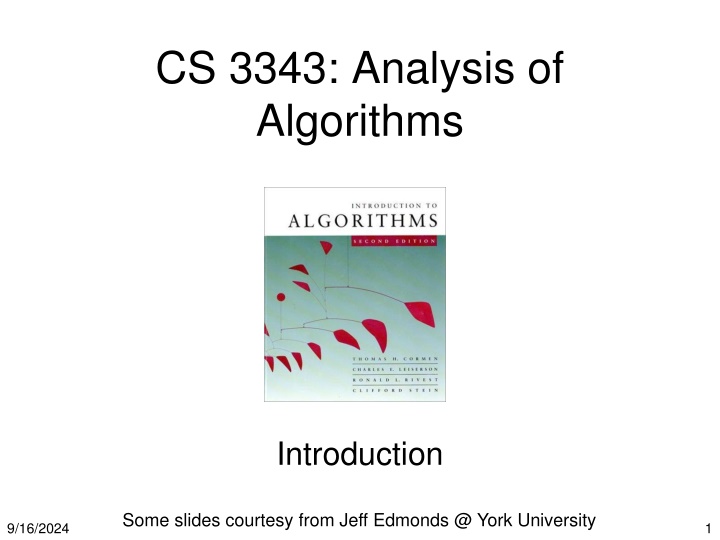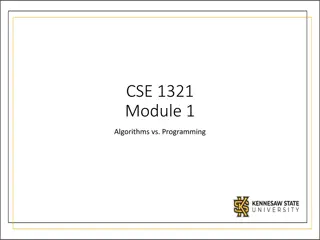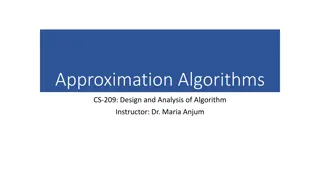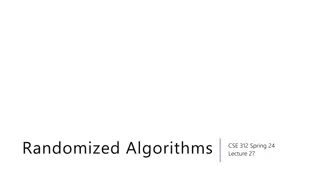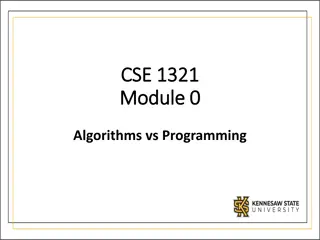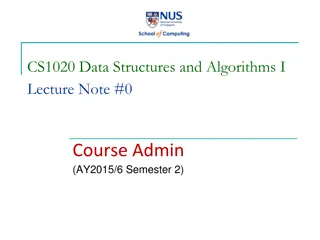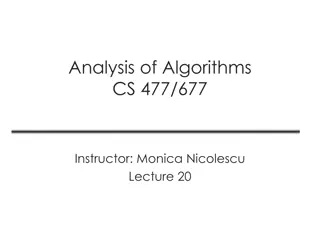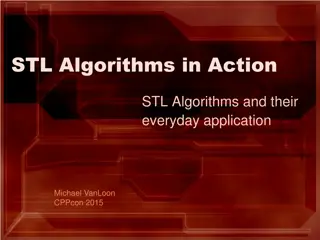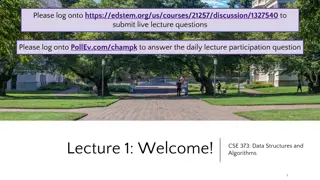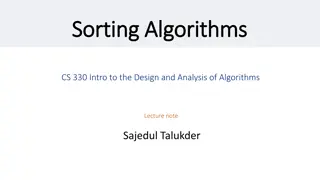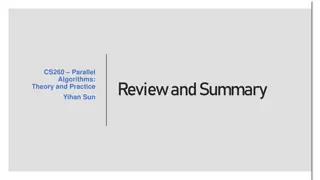CS 3343: Analysis of Algorithms Course Overview
Comprehensive overview of the CS 3343 course on the design and analysis of algorithms at York University. Includes details about the course instructor, purpose, format, grading policy, late homework submissions, and exam regulations. Emphasis on mandatory recitations, homework assignments, quizzes, and exams with specific guidelines and penalties. Clear explanation of the course structure and requirements for successful completion.
Download Presentation

Please find below an Image/Link to download the presentation.
The content on the website is provided AS IS for your information and personal use only. It may not be sold, licensed, or shared on other websites without obtaining consent from the author.If you encounter any issues during the download, it is possible that the publisher has removed the file from their server.
You are allowed to download the files provided on this website for personal or commercial use, subject to the condition that they are used lawfully. All files are the property of their respective owners.
The content on the website is provided AS IS for your information and personal use only. It may not be sold, licensed, or shared on other websites without obtaining consent from the author.
E N D
Presentation Transcript
CS 3343: Analysis of Algorithms Introduction Some slides courtesy from Jeff Edmonds @ York University 9/16/2024 1
The course Instructor: Dr. Jianhua Ruan Jianhua.ruan@utsa.edu Office: NPB 3.318 Office hours: see course webpage (cs.utsa.edu/~jruan/ under Teaching and link to current CS3343) TA&Grader: see course webpage 9/16/2024 2
The course Purpose: a rigorous introduction to the design and analysis of algorithms Textbook: Introduction to Algorithms, Cormen, Leiserson, Rivest, Stein An excellent reference you should own Go to course website for a link to the errata http://cs.utsa.edu/~jruan/teaching/cs3343_spring_2015/ Or go to http://cs.utsa.edu/~jruan/ then follow teaching . Under textbook 9/16/2024 3
Course Format 3 Lectures + 1 recitation / week Recitation Mandatory CS3343.001 should attend CS3341.001/002/005 CS3343.002 should attend CS3341.003/004 Otherwise may not receive credit for certain in-class exercises ~8 homework assignments Problem sets (paper-based) Typically due in 1-1.5 week Hard copy submission desired. For email submission, must put CS3343 in subject line. Otherwise may risk receiving no credit. ~8 in-class quizzes and exercises Two midterms + final exam 9/16/2024 4
Grading policy Homework: 25%. One lowest grade in homework will be dropped. Quiz and participation 5%. Midterm 1 and Midterm 2 will be averaged and compared with final exam. Whichever is greater will weight 50% and the other will weight 20%. I reserve the right to slightly adjust the weights of individual components if necessary. 9/16/2024 5
Late homework submissions 10% penalty if submitted the same day after the instructor left classroom 15% penalty each additional day after the submission deadline Submission will not be accepted once TA shows solution in recitation or instructor puts solution online Email submission is acceptable in case of emergency. Must include CS3343 in subject line. Otherwise may risk receiving no credit. 9/16/2024 6
Exams Exams cannot be made up, cannot be taken early, and must be taken in class at the scheduled time. Proofs are needed for exceptions or true emergencies 9/16/2024 7
Cheating You are not allowed to read, copy, or rewrite the solutions written by others (in this or previous terms). Copying materials from websites, books or any other sources is considered equivalent to copying from another student. If two people are caught sharing solutions, then both the copier and copiee will be held equally responsible, which will result in zero point in homework. Cheating on an exam will result in failing the course. 9/16/2024 8
Getting answers from the internet is CHEATING Getting answers from your friends is CHEATING I will send it to the Dean! You will be nailed! However, teamwork is encouraged. Group size at most 3. Clearly acknowledge who you worked with. 9/16/2024 9
Do NOT get answers from other groups! Do NOT do half the assignment and your partner does the other half. Each try all on your own. Discuss ideas verbally at a high- level but write up on your own. 9/16/2024 10
Attendance Missing 3 or more classes / recitations (whenever attendance is checked) will result in a minimum of 5 points taken off your final grade In reality, attendance and final grade are highly correlated 9/16/2024 11
Feedbacks We appreciate your feedbacks Your feedbacks help me know how I can better deliver my lectures, which will ultimately benefit you You get bonus points in homework for your feedbacks 9/16/2024 12
Introduction Why should you study algorithms What is an algorithm What you can expect to learn from this course 9/16/2024 13
Please feel free to ask questions! Help me know what people are not understanding We do have a lot of material It s your job to slow me down 9/16/2024 14
So you want to be a computer scientist? 9/16/2024 15
Is your goal to be a mundane programmer? 9/16/2024 16
Or a great leader and thinker? 9/16/2024 17
Boss assigns task: Given today s prices of pork, grain, sawdust, Given constraints on what constitutes a hotdog. Make the cheapest hotdog. Everyday industry asks these questions. 9/16/2024 18
Your answer: Um? Tell me what to code. With more sophisticated software engineering systems, the demand for mundane programmers will diminish. 9/16/2024 19
Your answer: I learned this great algorithm that will work. Soon all known algorithms will be available in libraries. Your boss might change his mind. He now wants to make the most profitable hotdogs. 9/16/2024 20
Your answer: I can develop a new algorithm for you. Great thinkers will always be needed. 9/16/2024 21
How do I become a great thinker? Maybe I ll never be 9/16/2024 22
Learn from the classical problems 9/16/2024 23
Shortest path end Start 9/16/2024 24
Traveling salesman problem 9/16/2024 25
Knapsack problem 9/16/2024 26
There is only a handful of classical problems. Nice algorithms have been designed for them If you know how to solve a classical problem (e.g., the shortest-path problem), you can use it to do a lot of different things Abstract ideas from the classical problems Map your boss requirement to a classical problem Solve with classical algorithms Modify it if needed 9/16/2024 27
What if you can NOT map your boss requirement to any existing classical problem? How to design an algorithm by yourself? Learn some meta algorithms A meta algorithm is a class of algorithms for solving similar abstract problems There is only a handful of them E.g. divide and conquer, greedy algorithm, dynamic programming Learn the ideas behind the meta algorithms Design a concrete algorithm for your task 9/16/2024 28
Useful learning techniques Read Ahead. Read the textbook before the lectures. This will facilitate more productive discussion during class. Explain the material over and over again out loud to yourself, to each other, and to your stuffed bear. Be creative. Ask questions: Why is it done this way and not that way? Practice. Try to solve as many exercises in the textbook as you can. 9/16/2024 29
What will we study? Expressing algorithms Define a problem precisely and abstractly Presenting algorithms using pseudocode Algorithm validation Prove that an algorithm is correct Algorithm analysis Time and space complexity What problems are so hard that efficient algorithms are unlikely to exist Designing algorithms Algorithms for classical problems Meta algorithms (classes of algorithms) and when you should use which 9/16/2024 30
